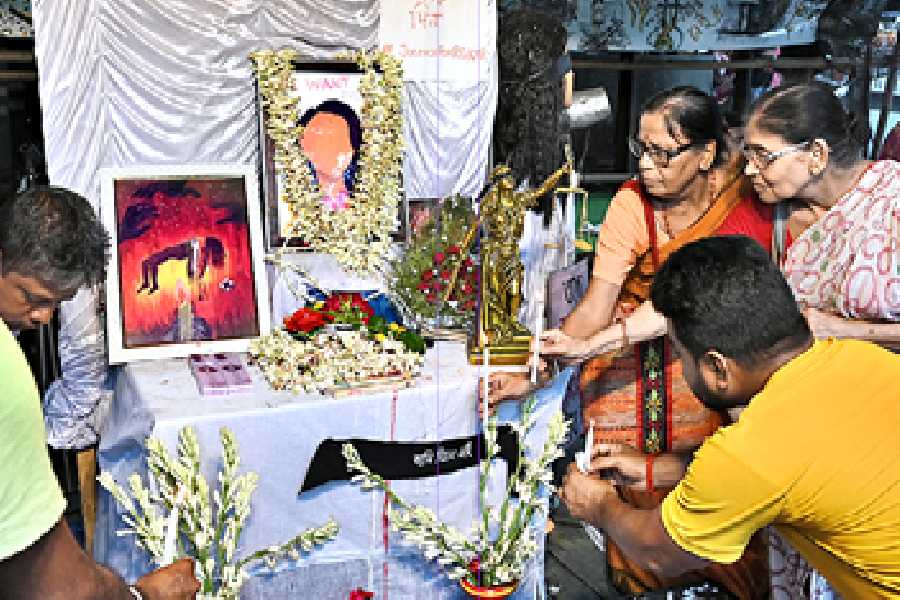It took an unrelenting doctors’ movement and unprecedented civil society support for the first decisive actions following the horrifying rape and murder in my unfortunate alma mater, RG Kar Medical College and Hospital; the shocking vandalism at the stroke of the midnight hour when the world slept and the hooligans awoke to life and freedom; and the deplorable accounts of graft within the medical administration that have emerged since then.
While we welcome the arrest and suspension of the ex-principal of RG Kar Medical College, we are very disappointed that even after a month, no further light has been shed on the crime itself and no clear path to justice charted during proceedings in the Supreme Court.
The passage of the Aparajita Woman and Child (West Bengal Criminal Laws and Amendment) Bill 2024 and the declaration of a slew of other government initiatives, including “Rattirer Sathi”, are well-intentioned, incremental, but ultimately preliminary steps. More robust and profound measures are required to improve workplace security for women in general and doctors in particular, as well as towards dismantling unholy syndicates within the medical administration.
Most importantly, the call for justice for the victim and her family should not drown amidst the din of either graft or graffiti. Hence, persistent questioning for accountability is both necessary and justified.
However, to be sustainable in the long term, the movement must evolve away from the continued disruption of medical services state-wide. Society at large echoes doctors’ outrage but one act of injustice should not beget another and leaving those in the last mile languishing is patently unjust.
The narrative that senior doctors are running services is misleading and morally ambivalent. Elective surgeries for serious conditions including cancer and cardiac diseases have been held in abeyance. The crushing patient flow in outpatient departments and emergency wards cannot be managed with a fraction of the required workforce without significant compromise on both quality and safety. So far, the public has supported this movement unequivocally and for us to succeed it would be wise to ensure it stays that way.
Moreover, the overwhelming support this landmark doctors’ movement has received from professional colleagues in the private sector is both unprecedented and momentous. This unity is heartening, especially because doctors have always been divided by sector, speciality and political affiliation. Yet, we have not seen private practitioners or hospitals halt emergency or outpatient services, elective surgeries or indoor admissions to any significant extent.
Presumably, this stems from their unwavering commitment to patient care. Thus, it is time for seniors from the private sector to walk their talk and counsel their juniors in-training at government hospitals to consider resuming at least emergency services, perhaps in relay, in the larger interest of public good. Alternatively, they may demonstrate their meaningful support to this movement by volunteering pro bono service in government hospitals until this crisis has been resolved.
Lastly, gifting the police a replica spine is good symbolism given the events so far,but let us remember thatmaligning any particular profession in sweeping broad brushstrokes is problematic, especially when junior doctors are avowedly protesting against a section of their own spineless and corrupt colleagues.
Men and women of integrity and goodwill populate every profession and dispensation. Rather, it is incumbent upon us to introspect upon the chronic illnesses that led to the events which has our state held in limbo today. A system does not deteriorate overnight. Neither can corruption be isolated in silos. Rampant systemic politicisation of education, administration and student life have been the hallmark of medicaltraining in West Bengal for generations.
Commission-based practice has become the norm rather than exception. These questions span decades and need addressing if we are serious about leveraging this historic movement to improve the system we all serve. For now though, let us continue to press for justice for the victim, her family and the medical fraternity ingeneral. And let us hope such justice is delivered by the highest judiciary of the land and not by questionably convened streetside courts from a dystopian Gotham-esque future.
Dr Biswanath Ghosh Dastidar is a fertility specialist and alumnus of RG Kar Medical College and Hospital











